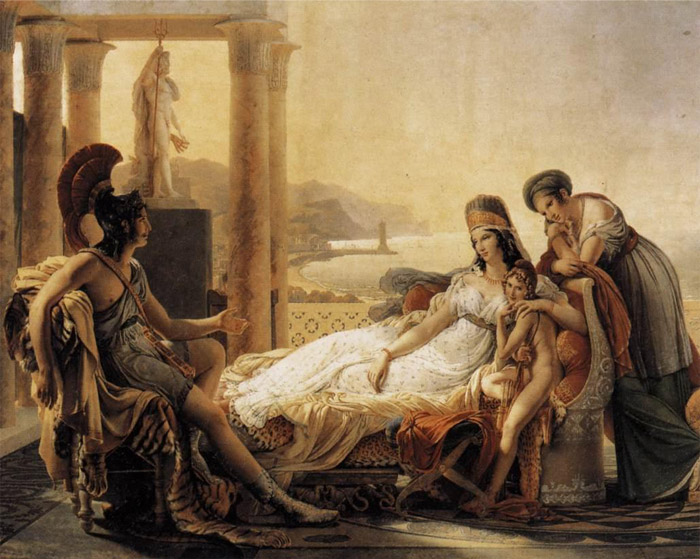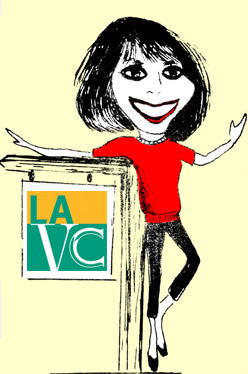"Dido and Aeneas" by Pierre Narcisse Guerin
Assignment #1
Choose one of the questions below for your essay response, or discuss another topic of interest based on our class’ literary readings. You are not required to include outside research for this essay. Your paper should be 6 – 7 typed, double-spaced pages.
1) Achilles set the model for a kind of heroism still immensely influential in the imagination of the West. His rage, egotism, and the motives that drive his tragic, obsessive behavior are compelling. Who is the true hero of the Iliad – Achilles or Hector?
2) Consider the presentation of the gods in Homer's epic poem. What is the gods' role? Do they control humans? Do humans have free will? Are the gods simply fickle, or do they support some essential order?
3) Although Medea is a woman, Euripides has presented her as a figure previously thought of as exclusively male - a hero. Analyze her character in the play as a combination of the salient qualities of Achilles.
4) Both Medea and Lysistrata deal with, among other things, a conflict between men and women and exploit the contrast between their situations and aspirations. Compare the treatment of sexuality and passionate love in Medea and Lysistrata.
5) Lysistrata is the earliest extant ancient Greek comic play to feature women in central roles and possibly the first play of its kind altogether. Lysistrata is now often seen as a statement of feminine solidarity and a feminist document. Do you see the play as a satirical attack on women; does Aristophanes actually make his female characters appear to be the butt of a joke?
6) Sophocles' Antigone is both admirable and troubling as a heroine, and despite characters' statements to the contrary, she reveals the power and influence that women in the Greek culture held. She defies Creon, the guard, and the law of Thebes, and through her actions, she gains the sympathy of of the populace, her sister, Tiresias, and Haimon. While her determination and independence are admirable, Antigone's apparently self-destructive resignation (she does not try to escape her punishment or to deny the charges that are made against her) lends a complexity to her character that is troubling. Are you sympathetic to her character?
7) Trace the pattern and discuss the significance of the following images throughout Sophocles' play: a) Oedipus as a hunter, b) Oedipus the plowman, c) Oedipus as sailor-helmsman (All 3 of these images reinforce the central idea of Oedipus as a symbolic representative of human progress, because the conquest of the wild beasts, the discovery of agriculture, and the mastery of the sea are important stages in our long development from “savagery” to “civilization”).
8) Compare the chorus in the three Greek tragedies.
9) Did Sophocles intend for his readers to regard Oedipus as a sympathetic figure and a good man who makes his decisions choosing from the highest motives, despite some of his frailties?
10) Aristotle’s Poetics is the first treatise ever written on literary composition (the Greek word poietes – poet – means, literally, “maker”). It has had an enormous influence on modern critical approaches to tragic drama. Particularly influential in the European Renaissance was the idea of the “tragic flaw”. Aristotle’s view of the tragic character as one who “falls by some mistake” can be applied to the works of some Greek tragic dramatists as well as the plays of William Shakespeare.
11) Apology is the Greek word for “defense”; The Apology of Socrates” is Plato's version of the one in which Socrates defended himself in court against the charges brought by his adversaries. Socrates insisted that true knowledge could not be simply proclaimed and accepted or rejected; student and teacher had to find their ways, through hard-won agreement on point after point, to definitions they could both accept and act on.
Plato's dialogues capture a defining moment in Greek culture, when oral traditions sustained by memorizing poetry like Homer's yielded to new styles of thought made possible by the writing of prose. What elements of Socratic dialectic seem, on the one hand, to reflect spoken discourse? What qualities of abstract thought expressed in that speech show, on the other hand, a shift away from the representation of thought through action characteristic of Homeric composition? (ex: See the opening of the Iliad, when the decision made by Achilles not to attack Agamemnon is attributed to the intervention of Athena, unseen by others, rather than to any process of internal rational analysis.)


